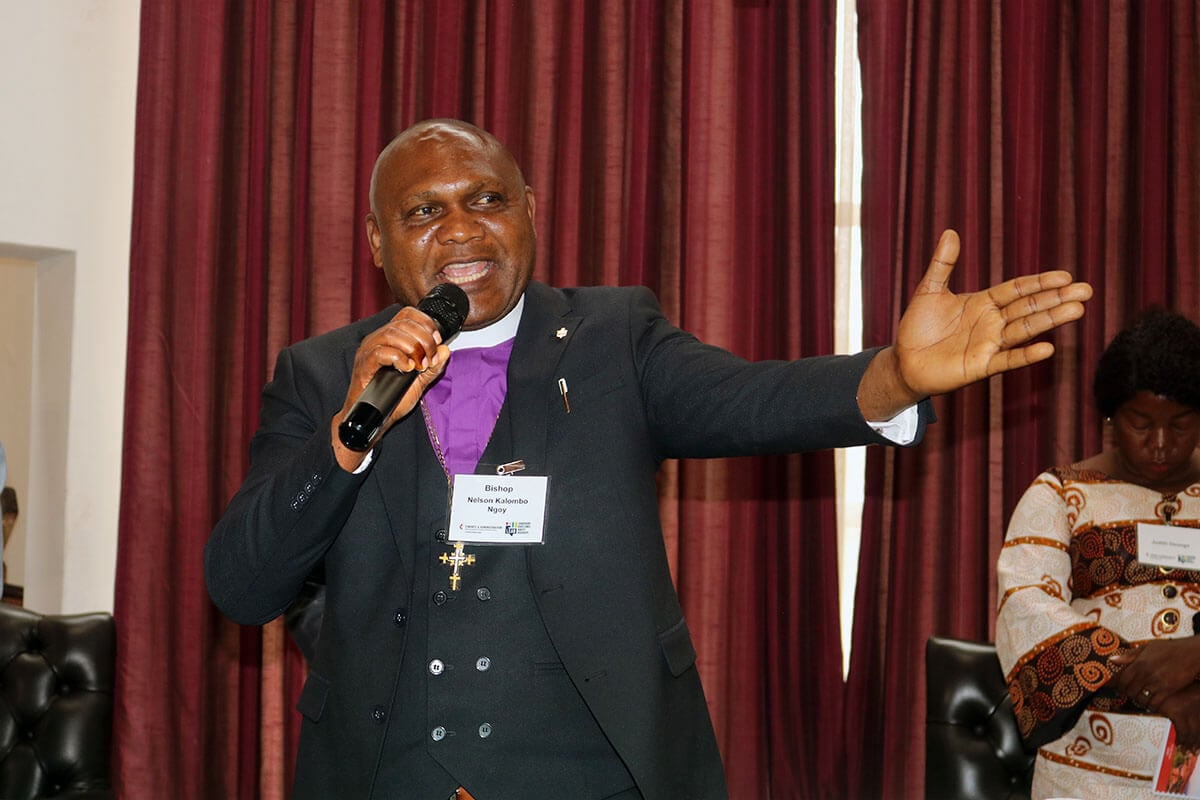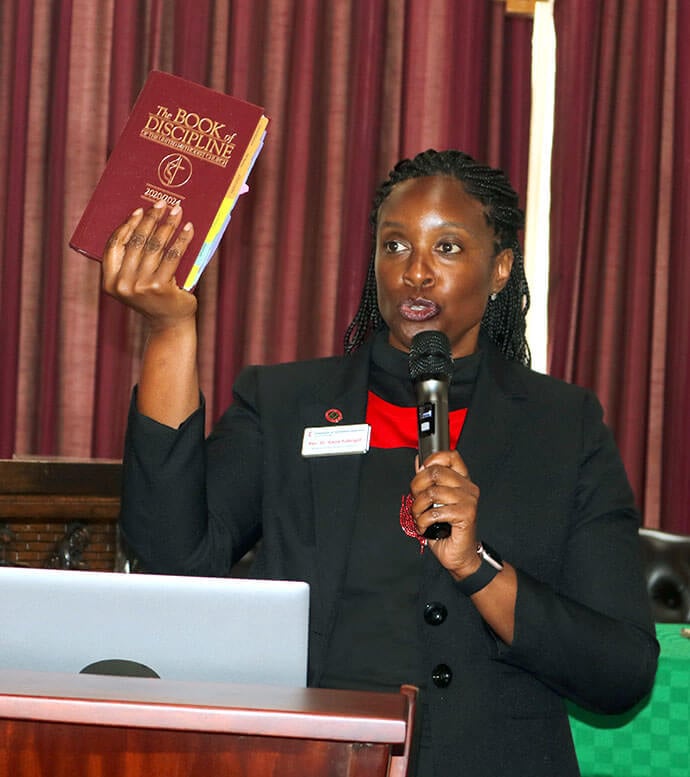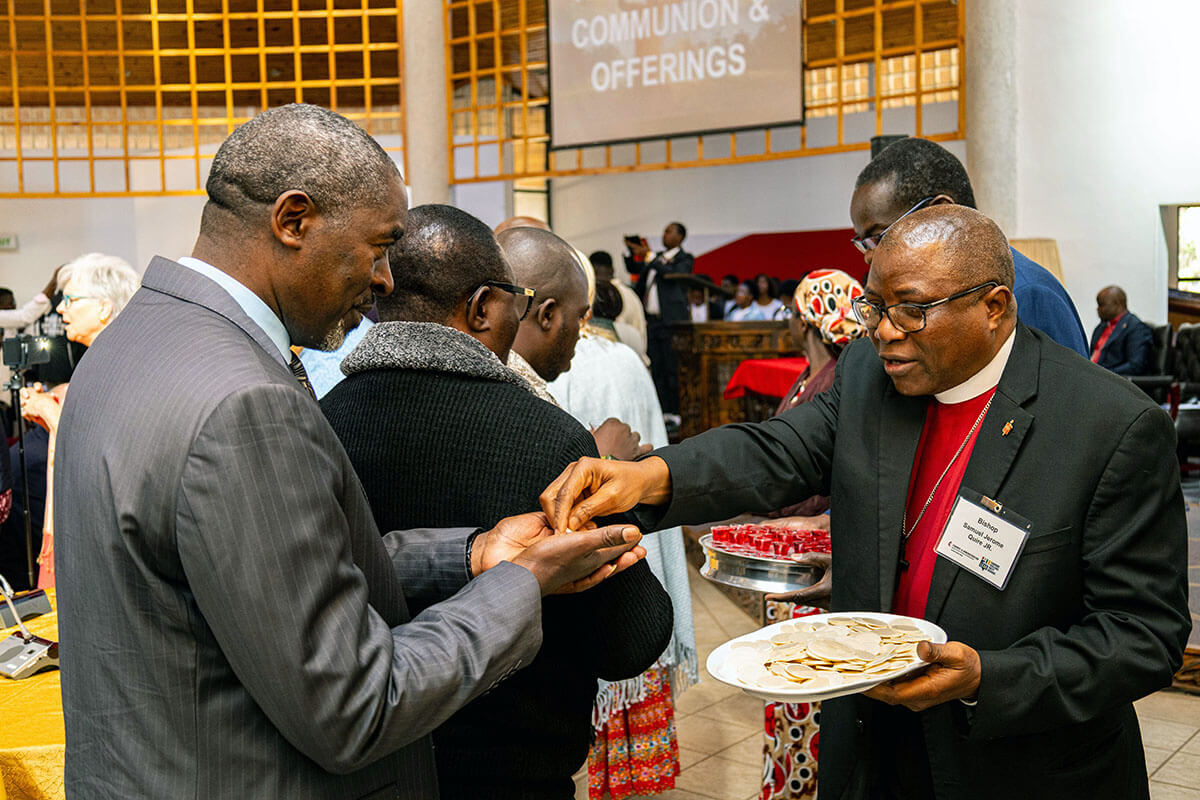Key points:
- The focus of the General Council on Finance and Administration’s Quad Training for African United Methodist leaders was stewardship of property, finances and data.
- The finance agency hopes to better support African leaders in encouraging connectional giving and collecting the membership data used to calculate the size of General Conference delegations.
- Leaders were grateful for the opportunity to interact with their peers from other conferences and share ideas regarding challenges they face.
- The meeting offered space for collaboration, listening and learning as participants shared experiences from their different contexts.
Over 100 African leaders gathered at a historic meeting designed for participants to learn, listen and collaborate to help chart the financial future of The United Methodist Church.
The Quadrennial Training, organized by the denomination’s finance agency, brought bishops, annual conference secretaries, chancellors, finance leaders and communicators into the same space at Africa University to discuss key concerns, including stewardship.
“The main focus of the event was stewardship, which includes property, financial, and even being good stewards of data,” said Ndzulo Tueche, the General Council on Finance and Administration’s connectional relations manager for central conferences in Africa, Europe and the Philippines.
More than 115 leaders from across the continent participated in the July 22-23 training, which was attended by 14 staff from United Methodist general agencies.
“We listened to our episcopal leaders and invited the leaders they believed would be instrumental in bringing back and sharing what they would have learned in this unique event,” Tueche said.

The training enabled the agency to gather insight that could help to further adapt some processes to better support leaders in Africa as they are called to make quicker decisions, promote giving and accountability as a lifestyle and encourage membership growth and sustainability, he said.
“One of our main takeaways is an air of hope. It is such an exciting and joyous time to be a United Methodist in Africa, where disciples are being made and the world is being transformed — largely because of these leaders that attended,” he said.
The event was the result of conversations between North Katanga Area Bishop Mande Muyombo and the Rev. Moses Kumar, the finance agency’s top executive.
“GCFA is grateful for not only the attendance of all African bishops, but the encouragement and cooperation they gave their leaders who are faithfully committed to carrying out stewardship across their many countries,” Kumar said in a press release.
This is the first time GCFA has hosted the training in Africa. Similar training was held in the U.S. earlier this year, and Quad Training for the Philippines is planned for October.
Bertile Enowmbi Agbor, a treasurer from Cameroon, attended the finance group discussions and discovered that her colleagues from other annual conferences faced similar challenges.
“We were trying to put our heads together to understand how we can better solve those problems to make our work go smoothly.
“I appreciated the presentations focusing on apportionments,” she said. “It reminded me of our obligations, especially as treasurers, to go back and work with our district superintendents and pastors, and to communicate with the local churches on our obligations to the general church.”

To fund denominational ministries, the finance agency collects apportionments — shares of giving — from annual conferences. These regional bodies in turn ask for apportionments from the local churches within their borders.
U.S. conferences distribute their apportionments among seven general-church funds, while annual conferences in Africa, Europe and the Philippines pay apportionments only to the Episcopal and General Administration funds.
Each of the seven funds supports a different category of ministry: bishops, ministerial education, general administration, the Black College Fund, Africa University, ecumenical work and the World Service Fund, which supports the work of most general agencies.
Bishop Muyombo is the president of the Africa Colleges of Bishops. He said he appreciated the focus on stewardship.
“The training encouraged us as Africans to participate in our connectional giving, recognizing the growth that we’ve been experiencing, and at the same time, committing ourselves to our United Methodist identity as a connectional church,” he said.
“The key takeaway for us as Africans was to look at the financial reality of where we are and acknowledge opportunities. Various leaders … came to hear, to see that reality and see how they can go back and encourage our members to have a sense of consciousness and participate in a connectional giving to be able to fund mission and ministries across the world.
“I’m hopeful that the time has come for us to share our growth with our siblings in other places of the world — in America, Europe, the Philippines — and that we let us continue to be committed to forming disciples of Jesus Christ with courage, loving graciously and serving joyfully while acknowledging our diversity, and love one another as siblings of Christ,” Muyombo said.
Subscribe to our
e-newsletter
The Rev. Aleze M. Fulbright, who serves as the secretary of General Conference, spoke about preparing for The United Methodist Church’s lawmaking assembly in 2028. Getting accurate and timely information from the continent needs to be a priority, she said.
“One of the commitments that I’ve made coming into this office is to be in collaboration, in connection, and for us to be in constant communication, and I feel this particular venue provides that opportunity of connection, collaboration and communication.
“I look forward to the way these leaders will take this information back and our commitment to continue to be in conversation with, particularly, annual conference secretaries,” Fulbright said.
Getting accurate membership statistics on the African continent has proven to be a mammoth task with some conferences failing to submit their journals containing membership information to General Conference. This is one of the key issues that annual conference secretaries were tasked to address, Fulbright said.
The United Methodist Church’s constitution mandates that each annual conference gets at least two General Conference delegates — one lay and one clergy. Beyond this mandatory minimum, conferences are allotted their delegate slates using a formula based on their lay and clergy membership numbers.
“It is one of our greatest challenges, particularly as I’m trying to discern the number for General Conference,” she said.
Speaking with UM News, Fulbright reflected on her interaction with the continent’s leadership.
“I just appreciated the energy of the leaders, the engagement, the proud nature of being United Methodist, being able to see our connection expand and just to know that God is doing a new thing and we get to be a part of it,” she said.
Bishop James Boye-Caulker of Sierra Leone said The United Methodist Church in Africa is a resilient church.
“We accommodate each one so that as a church, we see ourselves as a community. We see ourselves as partners in ministry. We see ourselves engaging in ministry in diverse ways so that as a church, we can move forward and see the reality of what is happening in other areas.”
The Rev. Davy Chingelesu, Zambia Conference dean of superintendents, said he appreciated the discussions with church legal advisers regarding the church’s trust clause, as it helped him with challenges his area is facing. Some United Methodist leaders in Africa have been dealing with church-property disputes with former members who have left the church. Some of those have resulted in violence and lawsuits.
“We were equipped with the material that we can use in order to retrieve back our properties,” Chingelesu said. “It was wonderful interacting with colleagues from different conferences and be reminded that when there is a breakaway, they are not supposed to take the property because the property is acquired in the name of The United Methodist Church. When we go back home, we’ll be able again to transmit this information to others so that they are aware.”
The ratification process for constitutional amendments approved by General Conference, including regionalization, also was discussed during the two-day meeting.
Bishop Joao F. Sambo of the Mozambique Episcopal Area said one of his conferences would call for a special annual conference because its ordinary session takes place after the ratification deadline in October. To be ratified, the amendments need at least a two-thirds total vote of annual conference lay and clergy voters around the globe. The Council of Bishops is expected to announce the results of the ratification votes during its fall meeting in November.
Sambo also noted the difficulties the church is facing in terms of apportionments.
“The training was a wake-up call or push in the positive sense that our annual conference must contribute because figures are declining every year, and that’s not good for our general church,” Sambo said.
Andrew Jensen, GCFA’s director of communications, said he was blessed to learn about African cultures and context during the meeting.
“I hope that I’ve been able to train just a small amount as much as I’ve learned. I’m learning about how joyful giving can be on the continent of Africa, and I really think that Africans can lead The United Methodist Church in showing what joyful giving looks like,” he said.
“We need to continue to invest in training those in Africa because they have the talents. They have all the resources they need to be successful. We just need to do a better job of training and communicating with them,” he added.
Bishop David Graves, president of GCFA’s board, said the aim of the training was to build relationships.
“We’ve just got to build bridges with one another, and we can learn from one another. So, we really wanted to bring people together. We wanted to share information, but we also wanted to do a lot of listening because we’ve all got something to learn from one another,” he said.
“It’s a new day in The United Methodist Church, and the connection is the beautiful thing of the church. What I have experienced is that people really have a hunger to have the right information and to do things right for the glory of God. And they just have a real appetite to just focus on Jesus.”
Chikwanah is a UM News correspondent based in Harare, Zimbabwe.
News media contact: Julie Dwyer at (615) 742-5470 or [email protected]. To read more United Methodist news, subscribe to the free UM News Digests.




